
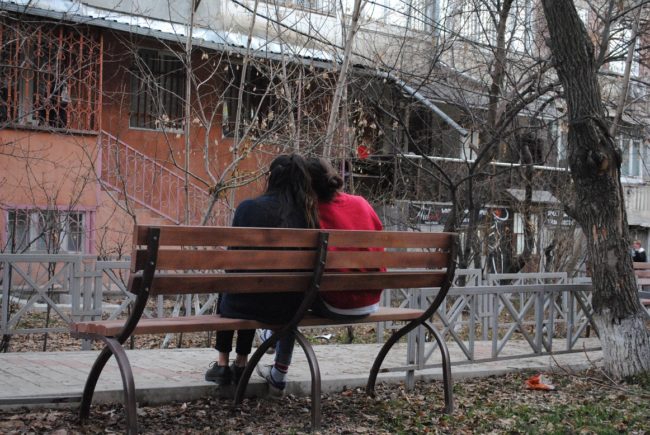
 Faced with bullying, discrimination, and violence queer people in the South Caucasus are frequently forced to flee their homes.
Faced with bullying, discrimination, and violence queer people in the South Caucasus are frequently forced to flee their homes.
Mel from Armenia
‘I was still in kindergarten when I realised I was born in someone else’s body. More precisely, I have never had any internal problems, I have just never been a “girl” and have never considered myself to be one. The problems I have encountered were the problems of the outside world, where at every step I have had to quarrel with those who treat me as if I were a girl. At school, I was forced to write on my workbooks “schoolgirl”. I would erase the “girl”, and teachers would add it again, and so on. My development was very straightforward, there was no moment I would consider the beginning of my identity discovery, as I have always considered myself a boy’, 30-year-old Mel Daluzyan from Gyumri tells OC Media.
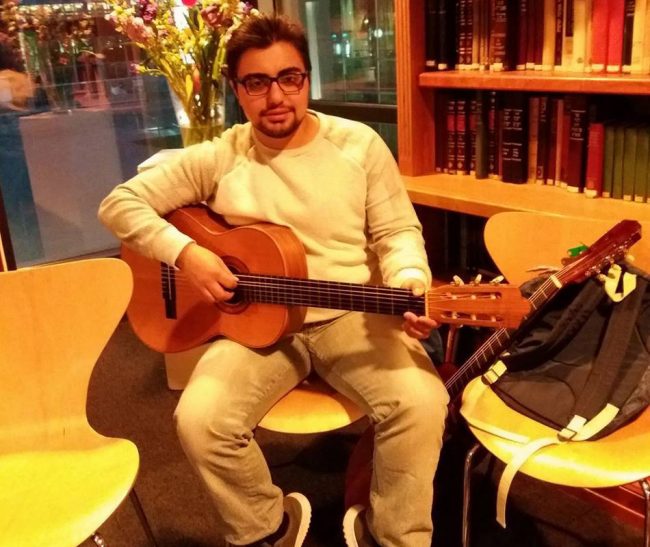
Despite Mel’s best efforts, to society, he was a girl named Meline. Mel has been weightlifting since 2002, joining the Armenian Weightlifting Federation’s women’s national team.
‘My trainer would try to inspire me, telling me God created me “like this” in order to be good at heavy lifting, and at some point, when I was still young, I also tried to look at it from this perspective. But I realised that despite everything, I also have the right to a personal life, the right to be happy, especially considering I’m not hurting anyone with my life and lifestyle’, says Mel.
According to Mel, when he participated in Pink Armenia’s first LGBT forum in Armenia in 2015, and a group photo of the participants was published online, the media began to discuss his personal life, threatening his career. The record-holding two-time European champion and double bronze world medalist left his birthplace Gyumri two years ago, settling abroad.
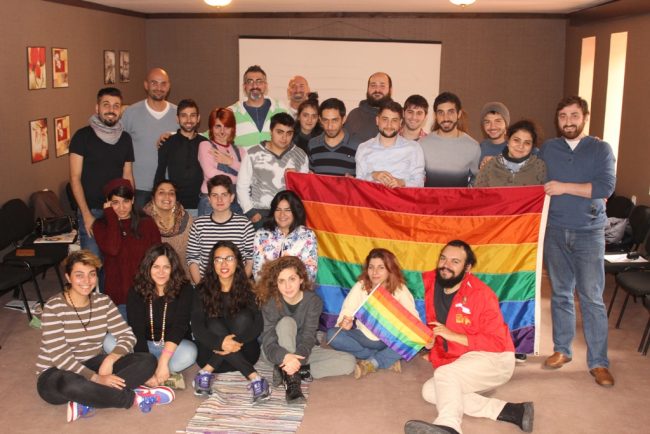
‘I left Armenia in 2016, after a year of unsuccessful attempts to find a job in my field. So many negative attitudes were spread towards me that I couldn’t even find a job as a trainer in a gym. Now I live in the Netherlands, I haven’t faced any discrimination here, only unconditional support in all matters. At this point, I am not even considering returning to Armenia, and I don’t see myself as a sportsman anymore but only as a trainer.’
Mel says that the life is difficult in Gyumri for those who are ‘different’, especially being famous.
‘Gyumri is the most conservative city in Armenia. The main problem was gossip: everybody considered it their sacred duty to invent a myth about me to explain what they didn’t understand, and the media helped to spread these rumours more. Of course, all of this created some difficulties for me when I appeared in my new environment, when I had to build my life again from nothing, but eventually, I succeeded in introducing myself to people as I am. I was able to achieve the fact that my friends won’t let anybody call me “Meline” ’.
According to Mel, there would be no problems with his parents if society had not interfered.
‘LGBT people in Armenia are deprived of almost all rights. Of course, if someone has a secret life, drowning out their identity, having a formal marriage, it’s possible to live “quietly” in Armenia. But judge for yourselves — how can it be considered a “quiet life”? I don’t have any friends who are not hiding and are able to live quietly’.
Mel does not want to discuss the details of his family life, only mentioning that today, he has everything he dreamed of.
Homosexuality has been legal in Armenia since 2003, but the rights of queer people are not protected under the law. A 2017 report on the human rights situation of queer people in Armenia by queer rights group Pink Armenia, said that despite the positive trend of a number of media outlets cooperating with rights groups and queer people to present their stories properly, the population of Armenia still had an overwhelmingly negative attitude towards queer people.
Research conducted in 2016 by Pink Armenia and think-tank the Caucasus Research Resource Center showed that 89% of Armenia’s population think homosexuals should not be allowed to work with children.
The research found that people who had less contact with queer people had more negative attitudes towards them than those with queer acquaintances.
People from queer rights groups insist that while the numbers are uncertain, many queer people leave Armenia every year due to homophobia.
Tazo from Georgia
Twenty-two-year-old Tazo Sozashvili can’t visit his family in Kakheti, the region in eastern Georgia where he was born and grew up. He is afraid he will be bullied because of his sexuality. He is afraid of what his family might have to go through if such a thing happened.
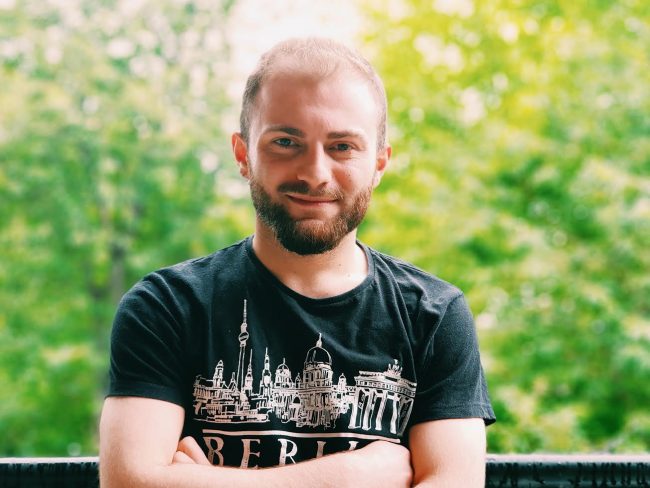
Tazo, who works for queer rights group the Equality Movement, recently made headlines with his emotional speech at the Georgian Parliament, where he tried to explain to lawmakers why it is so.
‘I cannot go to my village to see my parents, my grandmother, and grandfather. I was bullied at school for 12 years. I still hate to visit the place, because every day it was terrifying, each day meant facing death. Today I cannot visit my parents in Kakheti, because it is dangerous. This is the difference between me and you. You will never understand what it costs me to stand here and say this because it will cause problems for me. You will never understand this because you are white heterosexual privileged people. I hate you’ Tazo said on 1 May, in front of parliament’s Human Rights Committee after they went back on their promise to mark International Day Against Homophobia.
[Read more about Tazo’s protest at the parliament on OC Media: NGOs call on Georgia’s Human Rights Committee head to resign after queer activists’ protest]
After his TV appearance, he’s even more sure a homecoming is not going to happen anytime soon.
Since January, the Interior Ministry has arrested 10 people for homophobic hate crimes. In 2017, the prosecutor’s office examined 86 alleged hate crimes, 12 out of which were based on sexual orientation and 37 on gender identity.
The Public Defender’s report says violence against queer people, whether in the family or in public spaces, is a serious problem, and that the government has been unable to respond to this challenge.
Tazo’s speech was unplanned. Realising what his family might have felt after suddenly seeing him on TV, he decided to prepare them and called them. That’s when he came out to his mother.
‘She cried. Why would you do something like that? What will people say? — She asked with rebuke, but it was not anger she was speaking out of, it was regret’, Tazo says.
His phone was loaded with messages and calls. A lot of them were encouraging, but there were others who didn’t get it.
Tazo has not talked to his father since his speech.
‘All our relatives and friends have been calling him. He wanted to throw his phone away. They showed sympathy, which is rare because some families in the same situation have been pushed to leave villages’, Tazo says.
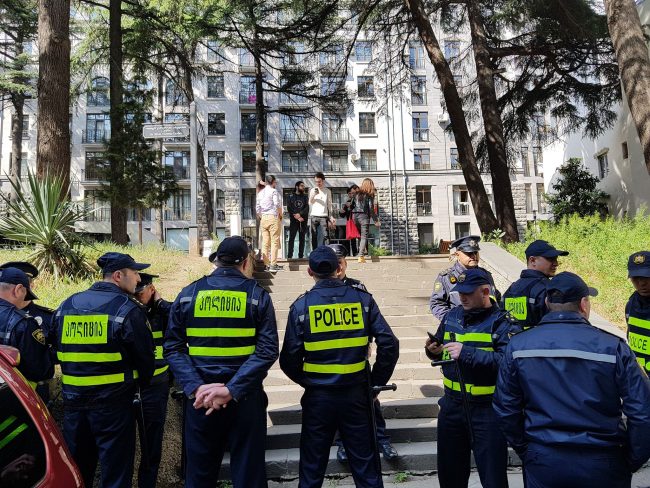
After his public coming out, several old acquaintances from the village tried to reconnect.
‘Around 10 people who I knew from the village sent me friend requests — they were asking why I’d think they were homophobes, that they’re here to help me and that only my well-being matters’, says Tazo.
But others were not so welcoming. They have been threatening him for several years now.
All these years visiting family was like walking on eggshells, and Tazo visited only twice a year. He was trying to remain unseen.
‘Now I’m pretty sure I can’t go back for a very, very long time. They have been threatening me for several years now. When these guys are together, they are very aggressive, but individually they have told me they understand me’, says Tazo.
For the first several days after his public coming out, Tazo was unable to use public transport. He was afraid of being recognised. But now it’s getting better.
‘Some of my acquaintances have told me they have seen a whole different me. They ask if there is anything they can do because they don’t want to raise their children in this kind of environment’, he says.
But it’s not the same for policymakers Tazo says. He says there are very few politicians who can see the severity of the issue and a few who can see it, but just don’t care.
Tazo says he is proud to have given voice to the ‘invisible people’.
‘This is not only my story. This is the voice and pain of thousands of people who fall victim to domestic violence, who are kicked out of their own homes, rejected by their parents, bullied at school, discriminated against at work because of their sexual orientation’.
There were times Tazo says he couldn’t speak aloud, but this has changed for him. He says he hopes it will change for other people too.
‘There is a point after which you just can’t take it anymore. There will come a time when many people will speak up, just like me, and we will all come together and demand that officials stand where they belong, and do live up to their responsibilities’, says Tazo.
Elvira and Amina from Azerbaijan
In September, OC Media spoke with Elvira and Amina, a couple living in Baku. Their lives have changed a lot over the past six months.
The women’s relationship started to move fast, and they moved in together six months after meeting. Shortly after this, they got married in a European country where same-sex marriage is allowed.
The couple says they felt that they had a truly nuclear family and that friends and relatives perceived them the same way. Elvira and Amina’s parents, albeit reluctantly, soon came around to the idea that they do not have sons-in-law, but daughters-in-law. However, the couple still felt uncomfortable in Azerbaijan and were thinking about emigrating.
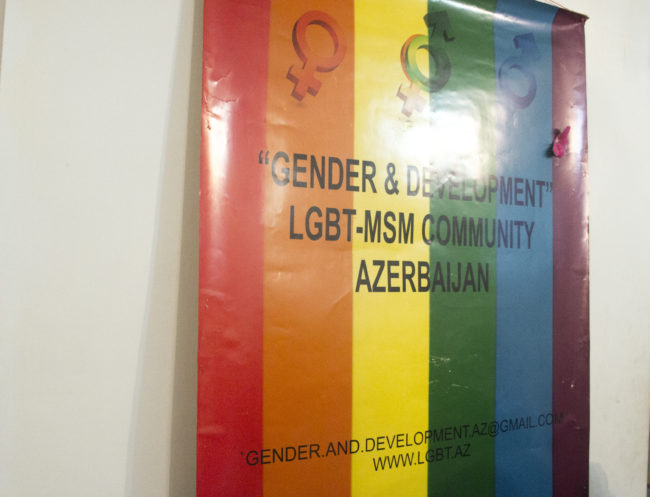
‘First of all, we were tired of being secretive’, Amina says. ‘Secondly, the certificate of marriage issued in Europe was not valid at home, and according to the law, we remained strangers to each other. Elvira’s young son lives with us and it’s hard to explain to him that he should not speak openly with other people. What if people, for example in the kindergarten, learned what our family looks like?’
As a result, their son became an indirect participant of almost criminal drama, which forced the family to leave Azerbaijan. No, he did not tell anything to anyone.
‘I lost some expensive gold jewellery from my jewellery box. They could only have been stolen by my son’s nanny. No one except her stayed in our apartment alone. We completely trusted her; it turned out in vain’, said Elvira.
When it came to the police, she neither recognised nor denied her guilt. Instead, she gave the investigator some impressively compromising evidence on her employers — intimate photos and videos.
‘We turned from victims into suspects. In any case, the investigator treated us as if we were suspects’, adds Elvira.
After the police officer received the compromising material, he told Elvira she should drop the charges — and not only because the nanny could publish their personal photos and video online. According to him, during the investigation, police would begin checking the couple’s ‘moral appearance’ (although, according to the law, it has no relevance to a case of theft), they would interview their parents and colleagues, up to the point where they could deprive their child of his mother. The investigator also advised Elvira to look closer at Amina as the possible jewel thief.
Elvira says that in the investigator’s office, she experienced one of the most terrible and humiliating moments in her life.
‘It was disgusting! I realised that this woman had been spying on us. I felt a sense of insecurity, the investigator’s gaze, and after being advised to lay low, we decided to leave this country as soon as possible.’
In mid-March, the family bought a one-way ticket and flew to the US.
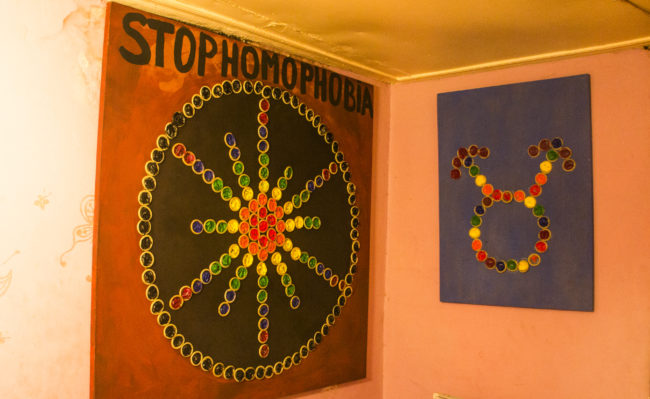
Until 2000, same-sex relationships were criminally punishable in Azerbaijan, with sentences of several years in prison. In 2000 same-sex relationships between people over the age of 16 became legal. But the ban and its subsequent repeal concerned only men. There was not a single word about queer women in the law.
Azerbaijan does not prohibit discrimination based on sexual orientation. For cases of blackmail, dismissal from work, and other cases of harassment, victims can file only a general complaint, for example, about a human rights violation. Gulnara Mehtieva, from the Nefes LGBT Azerbaijan Alliance, says that local queer activists are seeking the adoption of the relevant law.
In 2014, Nefes conducted a survey on attitudes towards queer people. The results showed that 56% of respondents consider queerness to be an innate disease, 60% of them treat queer people badly, and 64% would not want to work with them. Most of the respondents were young men with a higher education.
A number of queer people in Azerbaijan told OC Media that queer men are treated even worse than queer women. Human rights activist Eldar Zeynalov explains that Azerbaijan’s patriarchal society, where society sets high standards for a man’s ‘masculinity’ is primarily responsible for this.
‘For a man in a homosexual relationship, it’s as if he “reduces himself to the level of a woman” and humiliates himself, but also encroaches on the tradition and on the foundations of society,’ Zeynalov explains.
According to him, there is only one way for Azerbaijani society to accept queer people — money, power, or both.
‘Money and power for the majority in Azerbaijan are a stronger argument in favour of masculinity than sexual preferences. A rich and powerful man can be forgiven for much, including sexual relations with someone of the same sex’, Zeynalov added.
Amina and Elvira are now living in the US with their son. They are trying to get settled: looking for a job, settling into a new apartment, and getting used to not being afraid that someone will find out the truth about them.












